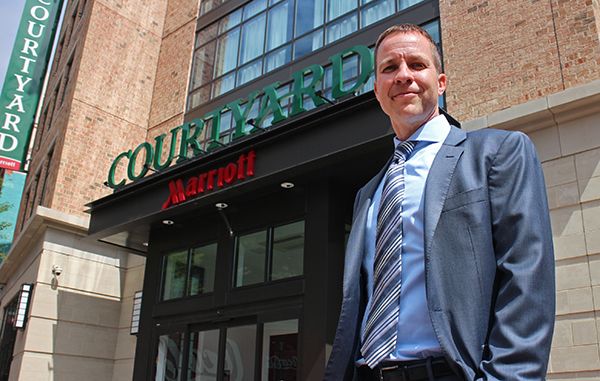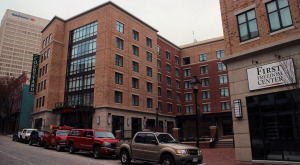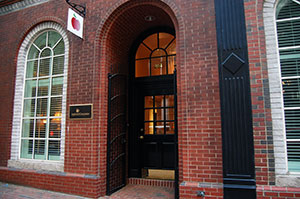
Apple Hospitality REIT’s Justin Knight took the helm from his father, Glade Knight. Photo by Jonathan Spiers.
Three months after its listing on the New York Stock Exchange, the Richmond-headquartered Apple Hospitality REIT is adjusting nicely to its status as a publicly traded company.
That’s according to president and CEO Justin Knight, who in a rare in-person interview said the company’s transition from a non-traded REIT to a full-fledged addition to the NYSE has been smooth and successful.
“The transition was a natural for us,” Knight said last week in the lobby of the Courtyard Richmond Downtown – one of three Marriott-brand hotels the REIT owns locally.
That transition has brought increased visibility for a company that in recent years has shied away from commenting at length beyond its regulatory filings on any of its activities, both related to big-money deals and some of the more controversial matters it was involved in.
That has changed since its listing May 18 on the NYSE, under the ticker symbol APLE.
Knight has lately been seen in interviews with multiple online business publications. And while the company was always required to file documents with the SEC, it also now hosts quarterly earnings conference calls – the first of which Knight presented to investors this month.
He acknowledged that report was a new experience all around – both for him and the company, as well as for investors, who he said enjoyed a new opportunity to ask questions directly to management.
“We’ve always been a public company. We’ve always filed financial statements and other details about our operations with the SEC,” Knight said. “With the transition to the public markets, we’ve added additional opportunities for individuals to ask questions in a public forum. Those options and opportunities weren’t necessarily available to us as an unlisted company.”
Knight said the stock market listing has not changed the company – created last year from the merger of three hotel-focused funds: Apple REIT Seven, Eight and Nine – in terms of corporate strategy. What the listing did, he said, was provide shareholders with an option to sell shares at their own discretion, whereas previously their shares were considered illiquid – purchased with an expectation, Knight said, that they would be invested for a period of time (five to 10 years) before they could gain liquidity.
“It’s also allowed new investors – institutional investors – an opportunity to invest with us as they buy shares from investors that were with us from inception,” Knight said. “So the mix of our shareholders is continually changing now.”
Since the listing, the company has also acquired three properties, at a cost of $103 million, bringing its portfolio to a total of 176 hotels in 32 states. Locally, it owns the Richmond Marriott on East Broad Street and the Courtyard Marriott and Residence Inn in Shockoe Slip.
Those recent acquisitions followed a sale in March of 18 of its properties for a total of $206 million. The company unloaded those properties soon after Knight’s father, Glade Knight, who founded the Apple REIT Cos. and serves as executive chairman of Apple Hospitality REIT, informed shareholders of its plans to pursue a public offering.
Justin Knight said such shuffling of properties is aimed at profitability, not volume, for the company’s investors.
“It’s far more important to our shareholders that we’re profitable than that we’re big,” Knight said. “The process that you’ve seen us undergo recently is really a process of refinement.

Apple REIT developed a $36 million dual hotel in Shockoe Slip that opened in December. Photo by Michael Schwartz.
“The result has been that we’ve sold a larger number of hotels than we’re buying, but it’s not about the number of hotels; it’s about the profitability of those individual hotels. And the hotels we’re buying are larger, better located hotels, generally speaking, than the hotels that we’re selling.”
In its second-quarter earnings report, net income totaled $44.2 million, up from $43.7 million the same quarter of 2014. Year-to-date net income totaled $88.1 million, compared to a loss of $50.6 million the first half of last year.
Knight, 42, has led the company as president since its inception and added CEO to his title when Apple Hospitality REIT was formed in 2014. He said the timing was right to pursue the public listing.
“Looking at our strategy, we’ve invested in Hilton and Marriott – in upscale, select service hotels, broadly geographically diversified across the United States. And we really have benefited from the growth in the broad economy,” he said. “We’ve seen job numbers improve, business spending improve, and all of those things, combined with low gas prices, have resulted in strong demand for the type of hotels that we invest in.”
Two figures used to gauge that performance are occupancy percentage and revenue per available room (RevPAR). According to its second-quarter earnings report, the company’s occupancy percentage was 81.9 percent, up from 80.9 percent the same quarter last year. Year-to-date occupancy was 78.1 percent, up from 76.6 percent the first six months of 2014.
RevPAR for the second quarter was $107.48, up from $101.17 in the same quarter last year. Year-to-date RevPAR was $100.98, up from $94.43 the first half of last year.
Recent years have also seen the number of lawsuits against the company from disgruntled investors decrease to just one that remains open. Several class-action suits were filed leading up to the merger that formed Apple Hospitality REIT. All but one of those cases have since been settled or dismissed, according to Knight and as shown in court and regulatory filings.
Knight said most of the impact of those suits came from the cost of defending itself.
“In each case, we were exonerated, but there is a cost of defense. And that’s unfortunate,” he said, “because that cost is borne by us and it’s borne by our other shareholders. While we’re pleased that those suits are behind us, it’s unfortunate because they were, during the period that they existed for us, a distraction and an expense for us.”
Knight said the company’s goal from here on out remains increasing the value of its shares for investors. The company’s stock price has remained at or near its initial offering of $18 per share since May, though Monday’s closing saw it drop to $16.61 per share.
“We’ve been pleased with the interest that we’ve seen in the company and with the reception that we’ve received from the analyst community and institutional investors,” he said.
“We did not raise any money or sell additional shares when we listed on the New York Stock Exchange, and yet we were able to fill several weeks’ worth of meetings with large institutions who wanted to hear about our story, were intrigued by the strategy and saw a unique opportunity based on that strategy to invest in this space.”
Correction: A previous version of this story incorrectly stated Apple Hospitality REIT’s revenue per available room or RevPAR. The story has been updated to reflect the correct figures.

Apple Hospitality REIT’s Justin Knight took the helm from his father, Glade Knight. Photo by Jonathan Spiers.
Three months after its listing on the New York Stock Exchange, the Richmond-headquartered Apple Hospitality REIT is adjusting nicely to its status as a publicly traded company.
That’s according to president and CEO Justin Knight, who in a rare in-person interview said the company’s transition from a non-traded REIT to a full-fledged addition to the NYSE has been smooth and successful.
“The transition was a natural for us,” Knight said last week in the lobby of the Courtyard Richmond Downtown – one of three Marriott-brand hotels the REIT owns locally.
That transition has brought increased visibility for a company that in recent years has shied away from commenting at length beyond its regulatory filings on any of its activities, both related to big-money deals and some of the more controversial matters it was involved in.
That has changed since its listing May 18 on the NYSE, under the ticker symbol APLE.
Knight has lately been seen in interviews with multiple online business publications. And while the company was always required to file documents with the SEC, it also now hosts quarterly earnings conference calls – the first of which Knight presented to investors this month.
He acknowledged that report was a new experience all around – both for him and the company, as well as for investors, who he said enjoyed a new opportunity to ask questions directly to management.
“We’ve always been a public company. We’ve always filed financial statements and other details about our operations with the SEC,” Knight said. “With the transition to the public markets, we’ve added additional opportunities for individuals to ask questions in a public forum. Those options and opportunities weren’t necessarily available to us as an unlisted company.”
Knight said the stock market listing has not changed the company – created last year from the merger of three hotel-focused funds: Apple REIT Seven, Eight and Nine – in terms of corporate strategy. What the listing did, he said, was provide shareholders with an option to sell shares at their own discretion, whereas previously their shares were considered illiquid – purchased with an expectation, Knight said, that they would be invested for a period of time (five to 10 years) before they could gain liquidity.
“It’s also allowed new investors – institutional investors – an opportunity to invest with us as they buy shares from investors that were with us from inception,” Knight said. “So the mix of our shareholders is continually changing now.”
Since the listing, the company has also acquired three properties, at a cost of $103 million, bringing its portfolio to a total of 176 hotels in 32 states. Locally, it owns the Richmond Marriott on East Broad Street and the Courtyard Marriott and Residence Inn in Shockoe Slip.
Those recent acquisitions followed a sale in March of 18 of its properties for a total of $206 million. The company unloaded those properties soon after Knight’s father, Glade Knight, who founded the Apple REIT Cos. and serves as executive chairman of Apple Hospitality REIT, informed shareholders of its plans to pursue a public offering.
Justin Knight said such shuffling of properties is aimed at profitability, not volume, for the company’s investors.
“It’s far more important to our shareholders that we’re profitable than that we’re big,” Knight said. “The process that you’ve seen us undergo recently is really a process of refinement.

Apple REIT developed a $36 million dual hotel in Shockoe Slip that opened in December. Photo by Michael Schwartz.
“The result has been that we’ve sold a larger number of hotels than we’re buying, but it’s not about the number of hotels; it’s about the profitability of those individual hotels. And the hotels we’re buying are larger, better located hotels, generally speaking, than the hotels that we’re selling.”
In its second-quarter earnings report, net income totaled $44.2 million, up from $43.7 million the same quarter of 2014. Year-to-date net income totaled $88.1 million, compared to a loss of $50.6 million the first half of last year.
Knight, 42, has led the company as president since its inception and added CEO to his title when Apple Hospitality REIT was formed in 2014. He said the timing was right to pursue the public listing.
“Looking at our strategy, we’ve invested in Hilton and Marriott – in upscale, select service hotels, broadly geographically diversified across the United States. And we really have benefited from the growth in the broad economy,” he said. “We’ve seen job numbers improve, business spending improve, and all of those things, combined with low gas prices, have resulted in strong demand for the type of hotels that we invest in.”
Two figures used to gauge that performance are occupancy percentage and revenue per available room (RevPAR). According to its second-quarter earnings report, the company’s occupancy percentage was 81.9 percent, up from 80.9 percent the same quarter last year. Year-to-date occupancy was 78.1 percent, up from 76.6 percent the first six months of 2014.
RevPAR for the second quarter was $107.48, up from $101.17 in the same quarter last year. Year-to-date RevPAR was $100.98, up from $94.43 the first half of last year.
Recent years have also seen the number of lawsuits against the company from disgruntled investors decrease to just one that remains open. Several class-action suits were filed leading up to the merger that formed Apple Hospitality REIT. All but one of those cases have since been settled or dismissed, according to Knight and as shown in court and regulatory filings.
Knight said most of the impact of those suits came from the cost of defending itself.
“In each case, we were exonerated, but there is a cost of defense. And that’s unfortunate,” he said, “because that cost is borne by us and it’s borne by our other shareholders. While we’re pleased that those suits are behind us, it’s unfortunate because they were, during the period that they existed for us, a distraction and an expense for us.”
Knight said the company’s goal from here on out remains increasing the value of its shares for investors. The company’s stock price has remained at or near its initial offering of $18 per share since May, though Monday’s closing saw it drop to $16.61 per share.
“We’ve been pleased with the interest that we’ve seen in the company and with the reception that we’ve received from the analyst community and institutional investors,” he said.
“We did not raise any money or sell additional shares when we listed on the New York Stock Exchange, and yet we were able to fill several weeks’ worth of meetings with large institutions who wanted to hear about our story, were intrigued by the strategy and saw a unique opportunity based on that strategy to invest in this space.”
Correction: A previous version of this story incorrectly stated Apple Hospitality REIT’s revenue per available room or RevPAR. The story has been updated to reflect the correct figures.




I think your RevPAR figures might be about a million times (literally) too high.